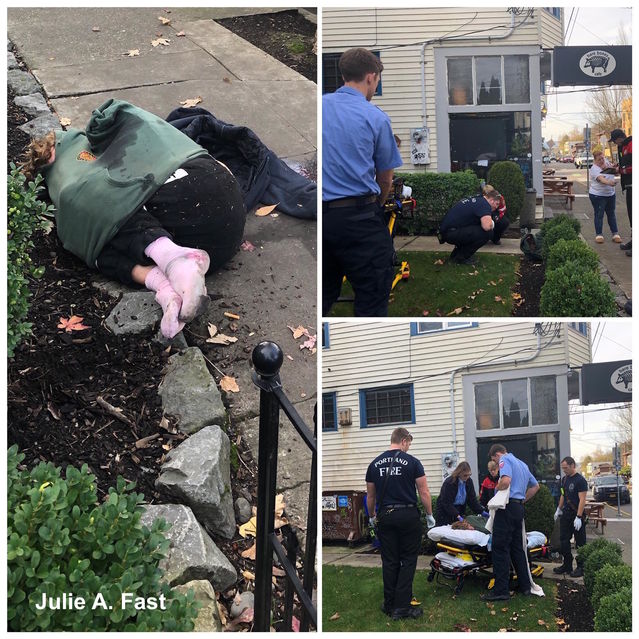Bipolar Disorder
Why Rock Bottom in Serious Mental Illness Is Death
Help is needed when symptoms take away rational thought.
Posted February 14, 2019 Reviewed by Ekua Hagan
Key points
- Many of those with serious mental illness will never hit "rock bottom and realize they need help.
- Serious mental illness can take away a person's insight into the state of their own mental and physical health.
- Those with serious mental illness are often not in "denial" because they lack insight into the problem in the first place.

The idea that someone needs to hit rock bottom before getting help for a serious mental illness is a myth. I often hear loving parents say, "He will get help when he’s ready! ” or, “Maybe a few days on the street will be good for him!” or ”She will finally say yes to meds when she realizes the damage bipolar is doing to her life!"
Serious Mental Illness, SMI, includes bipolar disorder, schizoaffective disorder, and schizophrenia. In SMI, there is no rock bottom.
Rock bottom is often death.
Here is an example from my own life: The man in the accompanying pictures is named Scott. I drove by and saw him hit his head on a rock as he fell. Then he threw up. He was homeless. I got him to talk with me and called for services. He was hallucinating and looked very sick. I’m used to this as I live in a city, Portland, Oregon, that believes people who are mentally ill have the right to refuse help and die on the streets. I also noticed that a police car, a fire truck, and an ambulance arrived on the scene from my 911 call along with all of the emergency professionals who poured out of those vehicles. Think of the cost.

People like Scott and myself will never hit rock bottom and realize we need help when we are sick.
Here’s why:
1. Most people with SMI have a lack of insight that comes and goes depending on symptoms. My official diagnosis is schizoaffective disorder. I have bipolar disorder and a separate psychotic disorder. I fight lack of insight regularly, and I’ve spent the past 20 years learning to manage my mental health. I have enormous insight as compared to others with SMI, but compared to the regular population, even I lack the insight needed to take care of myself when I am ill.
2. Denial is not a part of serious mental illness when a person with SMI is really sick. Denial implies that a person knows what is happening but chooses to ignore the signs. For example, a person with a severe alcohol dependency might be fully aware that if he keeps drinking he's going to ruin his liver, but he keeps drinking despite this awareness. There is no judgment here, but this is an example of denial. In SMI, a person can have teeth rotting out of her head, long, dirty fingernails, matted hair, and a sleeping bag on the street for a bed and still say and believe, "There's nothing wrong with me! You are the one with a problem!"
There is no rock bottom for us as rock bottom requires self-awareness that is simply not available when we are sick.
Don't expect insight from someone with SMI. In my opinion, those of us with bipolar disorder, schizoaffective disorder, and schizophrenia need people and society to make decisions for us when we are too sick to ask for help. Without this, our rock bottom is death.
3. The idea of individual rights is skewed when it comes to SMI. The idea of rock bottom is based on the idea that individuals are always able to make a rational choice about life or death situations. I completely—and I do mean completely—disagree and believe in society over the individual when it comes to mental health treatment. The concept of individual rights doesn't apply to someone who is not in his or her right mind. We are not in our right minds when we are sick.
If you love someone with an SMI, you have tough decisions to make. Waiting until that person sees the light, knows they need help, asks for help, or finally hits rock bottom means you could see the person you love lose everything or die.
What can we do?
- Get involved. Learn about HIPAA and how it prevents families from protecting their loved ones. Work with legislation that is committed to balancing HIPAA. Think of our society and work with advocates to get help for people at home and on the streets who are too sick to ask for treatment. (I hope that people at the ACLU, people in the anti-psych movement, and those who believe in individual rights above society rights can see that the world this creates is not sustainable.)
- Read the work of DJ Jaffe, author of Insane Consequences: How the Mental Health Industry Fails the Mentally Ill; Pete Early, author of Crazy: A Father's Search Through America's Mental Health Madness; and Xavier Amador, author of I Am Not Sick, I Don't Need Help! How to Help Someone With Mental Illness Accept Treatment.
It is ok to have an opinion different than the mainstream. I ask that society make decisions for those of us with serious mental illness. I believe in required mental health treatment, anti-psychotic shots for florid psychosis, and safe places for people with SMI to live.
We can work together to create long-term treatment facilities and homes for people who live with serious mental illnesses. I am not talking about the institutions you see in horror movies. I am talking about asylums that achieve their original goal of healing and refuge. They were called asylums for a positive reason—asylums are a safe place to heal.
We need them again. Rock bottom is not dignity. Help us.


